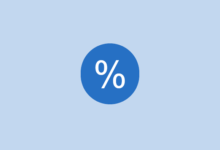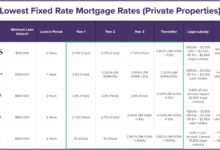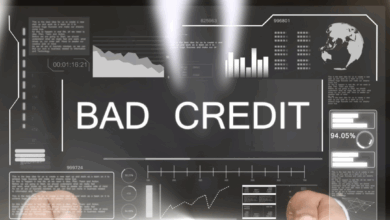Fixed Home Equity Loan Rates: A Comprehensive Guide
Fixed home equity loan rates play a crucial role in financial planning, offering stability and predictability for borrowers. Let’s delve into the world of fixed rates and explore their benefits and drawbacks.
This guide will provide you with valuable insights into fixed home equity loan rates, helping you make informed decisions about your financial future.
What are fixed home equity loan rates?
Fixed home equity loan rates refer to interest rates that remain constant throughout the life of the loan. This means that your monthly payments will not change, providing predictability and stability in your budgeting.
How Do Fixed Rates Work in Home Equity Loans?
In a fixed-rate home equity loan, the interest rate is determined at the time of loan approval and remains unchanged for the entire repayment period. For example, if you secure a fixed-rate home equity loan at 4%, you will continue to pay 4% interest on the remaining balance until the loan is fully repaid.
Comparing Fixed Rates with Variable Rates in Home Equity Loans
- Fixed Rates: Fixed rates provide certainty as your monthly payments remain constant, making it easier to budget and plan for the future. However, if market interest rates drop, you may not benefit from lower rates.
- Variable Rates: Variable rates can fluctuate based on market conditions, which means your monthly payments may change over time. While you may benefit from lower rates if market conditions are favorable, there is also the risk of rates increasing, leading to higher payments.
Benefits of fixed home equity loan rates
Fixed home equity loan rates offer several advantages for borrowers looking for stability and predictability in their loan payments. Let’s explore the benefits of opting for fixed rates and how they can provide financial security.
Advantages of fixed rates
- Stability: Fixed rates ensure that your monthly payments remain consistent throughout the loan term, making it easier to budget and plan for expenses.
- Predictability: Borrowers know exactly how much they need to pay each month, eliminating the uncertainty associated with variable rates that can fluctuate over time.
- Protection against rising interest rates: Fixed rates shield borrowers from potential increases in interest rates, providing a sense of security against market fluctuations.
Scenarios where fixed rates are favorable
- Long-term loans: If you plan to repay your home equity loan over an extended period, fixed rates can offer peace of mind by ensuring consistent payments.
- Low-interest rate environment: When interest rates are low, locking in a fixed rate can be beneficial as it protects you from future rate hikes.
Potential drawbacks of fixed rates
- Higher initial rates: Fixed rates may start higher than variable rates, which could result in higher initial payments for borrowers.
- No benefit from rate decreases: If market interest rates drop, borrowers with fixed rates will not benefit from the lower rates unless they refinance their loan.
Tips to secure the best fixed home equity loan rates
- Compare offers from multiple lenders to find the most competitive rates.
- Maintain a good credit score to qualify for lower interest rates.
- Consider the loan term and choose a fixed rate that aligns with your financial goals.
Comparison table: Fixed vs. Variable home equity loan rates
| Aspect | Fixed Rates | Variable Rates |
|---|---|---|
| Stability | Consistent monthly payments | Payments can fluctuate |
| Predictability | Know monthly payment amount | Payments can vary |
| Interest rate changes | Protected from rate increases | Subject to market fluctuations |
Calculating the total cost of a fixed-rate home equity loan
Total cost = Loan amount + Total interest paid over the loan term
Impact of economic factors on fixed rates
- Economic conditions can influence fixed rates, with factors like inflation, Federal Reserve policies, and market trends affecting interest rates.
- Borrowers can navigate through rate fluctuations by staying informed about economic indicators and considering refinancing options if rates become more favorable.
Factors influencing fixed home equity loan rates
When it comes to fixed home equity loan rates, there are several key factors that play a significant role in determining the interest rate a borrower will receive. Understanding these factors can help individuals make informed decisions when considering a home equity loan.
Economic Conditions
Economic conditions have a major impact on fixed home equity loan rates. In times of economic growth, interest rates tend to rise as the demand for loans increases. On the other hand, during economic downturns, interest rates may decrease to stimulate borrowing and spending. Factors such as inflation, unemployment rates, and government monetary policies all play a role in influencing fixed rates.
Credit Scores and Loan Terms
Another crucial factor that affects fixed home equity loan rates is the borrower’s credit score. Lenders use credit scores to assess the risk of lending money to an individual. A higher credit score typically results in lower interest rates, while a lower credit score may lead to higher rates or even loan denial. Additionally, the loan terms, such as the loan amount, repayment period, and loan-to-value ratio, can impact the fixed rates offered to borrowers.
How to find the best fixed home equity loan rates
When looking for the best fixed home equity loan rates, it’s crucial to do your research and compare rates from different lenders. This can help you secure a loan with favorable terms and save money in the long run.
Research and Compare Rates
- Start by researching various lenders in your area or online to see what fixed rates they offer for home equity loans.
- Compare the interest rates, terms, and fees associated with each loan to determine which option best fits your financial needs.
- Consider using online comparison tools to easily compare rates from multiple lenders at once.
Shopping Around for the Best Rates
- Don’t settle for the first rate you come across – shop around and get quotes from multiple lenders to ensure you’re getting the best deal.
- Check with credit unions, banks, and online lenders to explore all your options and find the most competitive rates available.
- Keep in mind that even a small difference in interest rates can add up to significant savings over the life of your loan.
Negotiating with Lenders
- Once you’ve done your research and compared rates, don’t be afraid to negotiate with lenders to try and secure a better rate.
- Highlight your strong credit history, steady income, and any assets you have to potentially qualify for a lower rate.
- Consider asking for a rate match if you find a better offer elsewhere, as some lenders may be willing to match or beat competitor rates to win your business.
Risks associated with fixed home equity loan rates
When considering fixed home equity loan rates, it is essential to be aware of the potential risks involved. While fixed rates offer stability and predictability, there are certain drawbacks that borrowers should consider before making a decision.
Market Fluctuations
Fixed home equity loan rates are not influenced by changes in the market, which means that borrowers may miss out on potential savings if interest rates decrease. In a scenario where market rates drop significantly, borrowers with fixed rates may end up paying more in interest compared to those with variable rates.
Lock-in Periods
Some fixed home equity loans come with lock-in periods, during which borrowers are unable to refinance or adjust their rates. This means that if interest rates decline or if there are changes in the borrower’s financial situation, they may be stuck with a higher interest rate than what is currently available in the market.
Higher Initial Rates
Fixed home equity loan rates tend to be higher initially compared to variable rates. While this provides stability in payments, it may result in higher overall costs over the life of the loan, especially if the borrower plans to sell or refinance the property in the near future.
Prepayment Penalties
In some cases, fixed home equity loans may come with prepayment penalties if the borrower decides to pay off the loan early or refinance. These penalties can add to the overall cost of the loan and limit the borrower’s flexibility in managing their finances.
Example Scenario
For instance, if a borrower anticipates interest rates to decrease in the near future, opting for a fixed home equity loan rate may not be the best choice as they would miss out on potential savings. In such a situation, a variable rate loan may offer more flexibility and cost savings over time.
Understanding the difference between fixed and adjustable home equity loan rates
When it comes to home equity loan rates, borrowers often have the choice between fixed rates and adjustable rates. Understanding the difference between these two options is crucial for making an informed decision that aligns with your financial goals.
Definition and comparison of fixed and adjustable rates
Fixed home equity loan rates remain constant throughout the life of the loan, providing predictability and stability in monthly payments. On the other hand, adjustable rates can fluctuate based on market conditions, leading to potential changes in monthly payments.
- Fixed rates:
- Predictable monthly payments
- Security against rate hikes
- Higher initial rates compared to adjustable rates
- No benefit if market rates decrease
Pros:
Cons:
- Adjustable rates:
- Potential lower initial rates
- Possible savings if market rates decrease
- Uncertainty in future payments due to rate fluctuations
- Risk of rates increasing over time
Pros:
Cons:
Suitability of fixed vs. adjustable rates
Fixed rates are more suitable for borrowers seeking stability and predictability in their monthly payments, especially in a rising interest rate environment. On the other hand, adjustable rates may be beneficial for those willing to take on some risk in exchange for potentially lower initial rates and savings if rates decrease.
Impact of credit score on fixed home equity loan rates
When it comes to fixed home equity loan rates, your credit score plays a crucial role in determining the interest rate you will be offered by lenders. Lenders use your credit score as an indicator of your creditworthiness, with higher scores generally resulting in lower interest rates.
How Credit Scores Influence Fixed Rates
Your credit score is a reflection of your credit history and helps lenders assess the level of risk involved in lending to you. A higher credit score typically indicates that you are a responsible borrower who is likely to repay the loan on time. As a result, lenders are more inclined to offer you lower fixed rates if you have a high credit score.
Strategies for Improving Credit Scores
If you have a lower credit score and want to secure better fixed rates on a home equity loan, there are a few strategies you can employ to improve your credit score. These include paying bills on time, reducing outstanding debt, and checking your credit report for any errors that could be negatively impacting your score.
Examples of Varying Fixed Rates Based on Credit Scores
| Credit Score Range | Fixed Home Equity Loan Rate |
|---|---|
| Excellent (750+) | 3.5% |
| Good (700-749) | 4.0% |
| Fair (650-699) | 5.0% |
| Poor (below 650) | 6.5% |
Fixed home equity loan rates vs. mortgage rates
When comparing fixed home equity loan rates to traditional mortgage rates, it’s important to understand the key differences in how these rates are calculated and why they vary. Let’s delve into the specifics of each type of rate and explore scenarios where one may be more advantageous than the other.
Fixed Home Equity Loan Rates vs. Mortgage Rates
Fixed home equity loan rates and mortgage rates differ in their calculation methods and the factors that influence them. Home equity loan rates are typically tied to the prime rate, while mortgage rates are influenced by broader economic factors and the bond market. This distinction can lead to variations in the rates offered for each type of loan.
- Home Equity Loan Rates:
- Calculation: Fixed home equity loan rates are determined based on the prime rate set by the Federal Reserve, plus a margin set by the lender.
- Influence of Factors: These rates are influenced by the borrower’s credit score, loan-to-value ratio, and the current economic environment.
- Mortgage Rates:
- Calculation: Mortgage rates are influenced by the overall economy, bond market trends, inflation, and the Federal Reserve’s monetary policy.
- Influence of Factors: Factors such as the borrower’s credit score, loan amount, down payment, and property location can impact mortgage rates.
In scenarios where interest rates are expected to rise, opting for a fixed home equity loan rate may be more beneficial as it offers protection against future rate hikes. On the other hand, if rates are projected to decline, a traditional mortgage with adjustable rates might provide cost savings in the long run.
| Key Differences | Fixed Home Equity Loan Rates | Mortgage Rates |
|---|---|---|
| Calculation Method | Based on prime rate + lender margin | Influenced by economy, bond market, Fed policies |
| Factors Influencing Rates | Credit score, loan-to-value ratio | Credit score, loan amount, down payment |
| Rate Stability | Stays constant over loan term | Can fluctuate with market changes |
To calculate monthly payments for both types of loans, you can use the following formula:
Monthly Payment = (Loan Amount x [Rate/12]) / (1 – (1 + Rate/12)^(-Loan Term in months))
By comparing the monthly payments for fixed home equity loan rates and mortgage rates, you can assess the impact of interest rates on the total cost of borrowing and make an informed decision based on your financial goals and market outlook.
Comparing fixed home equity loan rates across lenders
When comparing fixed home equity loan rates across different lenders, there are several key factors to consider that can influence the rates offered. Understanding these factors can help borrowers make informed decisions and secure the most competitive rates for their home equity loans.
Factors influencing fixed rates offered by lenders
- Credit Score: Lenders often use credit scores to determine the interest rates they offer. Borrowers with higher credit scores typically qualify for lower rates, while those with lower scores may face higher rates.
- Loan Amount: The amount of the loan can also impact the fixed rates offered by lenders. Larger loan amounts may come with lower rates, while smaller loans could have higher rates.
- Loan-to-Value Ratio: Lenders consider the loan-to-value ratio, which is the amount of the loan compared to the value of the home. A lower ratio often leads to more favorable fixed rates.
Impact of loan term on fixed rates and overall cost
- The length of the loan term can affect fixed rates and the total cost of a home equity loan. Shorter loan terms typically come with lower rates but higher monthly payments, while longer terms may have higher rates but lower monthly payments.
- Borrowers should carefully consider their financial situation and goals when choosing a loan term to ensure they select the most cost-effective option.
Types of fees associated with home equity loans
- Origination Fees: These are charges for processing a new loan application and can vary among lenders.
- Closing Costs: Expenses related to closing the loan, such as appraisal fees, attorney fees, and title search fees.
- Prepayment Penalties: Some lenders may charge fees for paying off the loan early, so borrowers should be aware of these potential costs.
Using online tools to compare rates and fees
- Borrowers can utilize online tools and resources to compare fixed rates, fees, and terms from various lenders efficiently.
- By entering their information and loan details, borrowers can receive personalized quotes and compare offers side by side to find the best option.
Negotiating with lenders for competitive rates
- Read the fine print in loan offers to understand any potential hidden fees or restrictions that could impact the overall cost of the loan.
- Borrowers should be prepared to negotiate with lenders to secure the most competitive fixed rates for their home equity loans.
- Consider factors like credit score, loan amount, and loan-to-value ratio when negotiating with lenders to potentially lower rates and reduce fees.
Considerations when refinancing to a fixed home equity loan
When considering refinancing to a fixed home equity loan, there are several factors to take into account to make an informed decision. Understanding the potential benefits and drawbacks of this financial move is crucial to ensure it aligns with your long-term financial goals.
Factors to Consider when Refinancing to a Fixed Rate
- Current Interest Rates: Compare the current fixed rates available with your existing adjustable rate to determine if refinancing makes financial sense.
- Financial Stability: Assess your financial situation to ensure you can comfortably manage the fixed monthly payments over the loan term.
- Loan Term: Consider the impact of changing the loan term when refinancing, as it can affect the total interest paid over time.
- Closing Costs: Factor in any closing costs associated with refinancing to determine if the overall savings justify the expenses.
Potential Benefits and Drawbacks of Refinancing to a Fixed Rate
- Benefits:
- Predictable Payments: Fixed rates offer stable monthly payments, making budgeting easier.
- Protection from Rate Increases: Shield yourself from rising interest rates by locking in a fixed rate.
- Drawbacks:
- Higher Initial Rates: Fixed rates may initially be higher than adjustable rates, impacting short-term affordability.
- Less Flexibility: Fixed rates do not adjust to market changes, potentially causing missed opportunities for lower rates.
Examples of Situations where Refinancing to a Fixed Rate Makes Sense
Refinancing to a fixed rate may be beneficial for homeowners who plan to stay in their home long-term, prefer stability in their monthly payments, or want to protect themselves from potential interest rate hikes in the future.
Difference between Fixed Rate and Adjustable Rate in a Home Equity Loan
When refinancing to a fixed rate in a home equity loan, the interest rate remains constant throughout the loan term, providing predictability in monthly payments. In contrast, an adjustable rate fluctuates based on market conditions, leading to variable monthly payments.
Comparison between Fixed Rate and Adjustable Rate Home Equity Loans
| Aspect | Fixed Rate | Adjustable Rate |
|---|---|---|
| Interest Rates | Stays constant | Varies based on market |
| Repayment Terms | Predictable monthly payments | Payments can change over time |
| Risks | No risk of rate hikes | Risk of increased rates |
A homeowner with plans to stay in their property long-term and seeking stability in monthly payments would benefit more from a fixed rate home equity loan.
Fixed home equity loan rates and tax implications
When it comes to fixed home equity loan rates, there are important tax implications that homeowners need to consider. Fixed rates can impact the tax deductions you may be eligible for, so it’s essential to understand how choosing fixed rates over other options can affect your tax situation.
Tax Deductions with Fixed Rates
- Interest payments on a home equity loan with a fixed rate may be tax-deductible, just like mortgage interest.
- Homeowners can typically deduct interest on up to $100,000 of home equity debt, regardless of how the funds are used.
- Choosing a fixed rate can provide stability in your interest payments, making it easier to track and deduct for tax purposes.
Impact of Fixed Rates on Tax Benefits
- Fixed rates can help homeowners maximize their tax benefits by ensuring consistent interest payments that are eligible for deduction.
- By opting for a fixed rate, homeowners can plan their finances more effectively and take advantage of potential tax savings.
- Variable rates, on the other hand, can lead to fluctuating interest payments, making it harder to predict and claim tax deductions accurately.
Example of Tax Benefits
For example, if you have a fixed-rate home equity loan with an interest rate of 4%, you can deduct the full amount of interest paid on that loan up to the limit set by the IRS.
With a fixed rate, you can confidently claim these deductions each year, knowing that your interest payments remain stable and tax-deductible.
Impact of market trends on fixed home equity loan rates
Market trends play a significant role in determining fixed home equity loan rates. Understanding how various economic factors influence these rates is essential for borrowers looking to secure a beneficial loan.
Analyze the impact of inflation rates on fixed home equity loan rates
Inflation rates can directly affect fixed home equity loan rates. As inflation rises, lenders may increase interest rates to compensate for the decreasing value of money. This can result in higher fixed rates for home equity loans, making borrowing more expensive for consumers.
Explain how changes in interest rates by the Federal Reserve affect fixed rates for home equity loans
The Federal Reserve’s decisions on interest rates can have a ripple effect on fixed home equity loan rates. When the Fed raises rates, lenders may follow suit by increasing fixed rates for home equity loans. Conversely, if the Fed lowers rates, borrowers may benefit from lower fixed rates on their home equity loans.
Provide a detailed comparison between fixed rates and variable rates for home equity loans
Fixed rates offer borrowers stability and predictability, as the interest rate remains constant throughout the loan term. In contrast, variable rates fluctuate based on market conditions, which can lead to unpredictable changes in monthly payments. While fixed rates may initially be higher, they can provide peace of mind for borrowers concerned about rising interest rates.
Explore the correlation between housing market conditions and fixed home equity loan rates
The health of the housing market can impact fixed home equity loan rates. In a strong housing market, lenders may offer more competitive rates to attract borrowers. Conversely, in a downturn, lenders may tighten lending requirements and increase rates to mitigate risk. Monitoring housing market conditions can help borrowers secure favorable fixed rates on their home equity loans.
Create a chart showcasing the historical average fixed rates for home equity loans over the past decade
Having a visual representation of historical fixed rates for home equity loans can provide valuable insights for borrowers. By analyzing trends over the past decade, borrowers can better understand how fixed rates have fluctuated and make informed decisions when securing a home equity loan.
Strategies for locking in favorable fixed home equity loan rates
When it comes to securing low fixed home equity loan rates, borrowers need to be strategic in their approach to ensure they get the best deal possible. One key strategy is understanding the concept of rate locking and knowing when to take advantage of market conditions.
Benefits of Rate Locking
- Rate locking allows borrowers to secure a specific interest rate for a set period, protecting them from potential rate increases.
- By locking in a rate, borrowers can budget effectively and have peace of mind knowing their monthly payments won’t fluctuate.
- Rate locking can be particularly beneficial when interest rates are low, helping borrowers capitalize on favorable market conditions.
Timing Rate Locks
- Monitoring interest rate trends and economic indicators is crucial when considering rate locks.
- It’s important to lock in a rate when you feel confident that rates are at their lowest point, but also consider potential future changes in the market.
- Timing rate locks during periods of economic stability or when rates are expected to rise can help borrowers secure a better deal.
Advantages of Early Lock-Ins
- Locking in a rate early can protect borrowers from rate increases if the market is volatile or rates are expected to rise.
- Early rate locks can provide certainty and stability for borrowers, especially if they are comfortable with the current rate offered.
- Waiting for potential rate drops may carry risks, as rates could increase unexpectedly, costing borrowers more in the long run.
Comparison of Fixed and Variable Rates
- Fixed rates offer stability and predictability, making them ideal for borrowers who prefer consistent monthly payments.
- Variable rates can fluctuate with market conditions, potentially offering lower initial rates but exposing borrowers to future rate hikes.
- Choosing between fixed and variable rates depends on individual risk tolerance and financial goals.
Fixed home equity loan rates and financial planning
When it comes to financial planning, understanding the difference between fixed and variable home equity loan rates is crucial. Fixed rates provide predictability in monthly payments, making it easier for homeowners to budget effectively.
Comparison between fixed rates and variable rates
Fixed rates offer the advantage of stable monthly payments throughout the loan term, providing homeowners with a sense of security and predictability. On the other hand, variable rates are subject to fluctuations based on market conditions, which can result in unpredictable changes in monthly payments.
- Fixed rates: Provide stability and consistency in monthly payments, making it easier to plan and budget effectively.
- Variable rates: Offer the potential for lower initial rates but come with the risk of increasing payments if interest rates rise.
It is essential to weigh the pros and cons of fixed and variable rates based on your financial goals and risk tolerance levels.
Calculating total interest paid
Calculating the total interest paid over the life of a fixed-rate home equity loan compared to a variable-rate loan can help homeowners make informed decisions.
| Factors | Fixed Rates | Variable Rates |
|---|---|---|
| Initial Interest Rates | Higher initial rates but remain constant | Potentially lower initial rates but subject to change |
| Rate Fluctuations | No fluctuations, payments remain the same | Subject to market fluctuations, payments may vary |
| Total Interest Paid | Calculate the total interest paid over the loan term for accurate comparison | Consider potential fluctuations and their impact on total interest paid |
Benefits of opting for a fixed-rate home equity loan
Illustrating scenarios where choosing a fixed-rate home equity loan is more beneficial can help homeowners align their financial goals with the right loan option.
- If you prioritize stability and predictability in monthly payments, a fixed-rate loan may be more suitable.
- For homeowners looking to avoid the risk of payment increases due to interest rate fluctuations, a fixed-rate loan provides peace of mind.
Last Recap
Understanding fixed home equity loan rates is essential for making sound financial choices. By weighing the advantages and potential drawbacks, you can navigate the world of loans with confidence and clarity.







